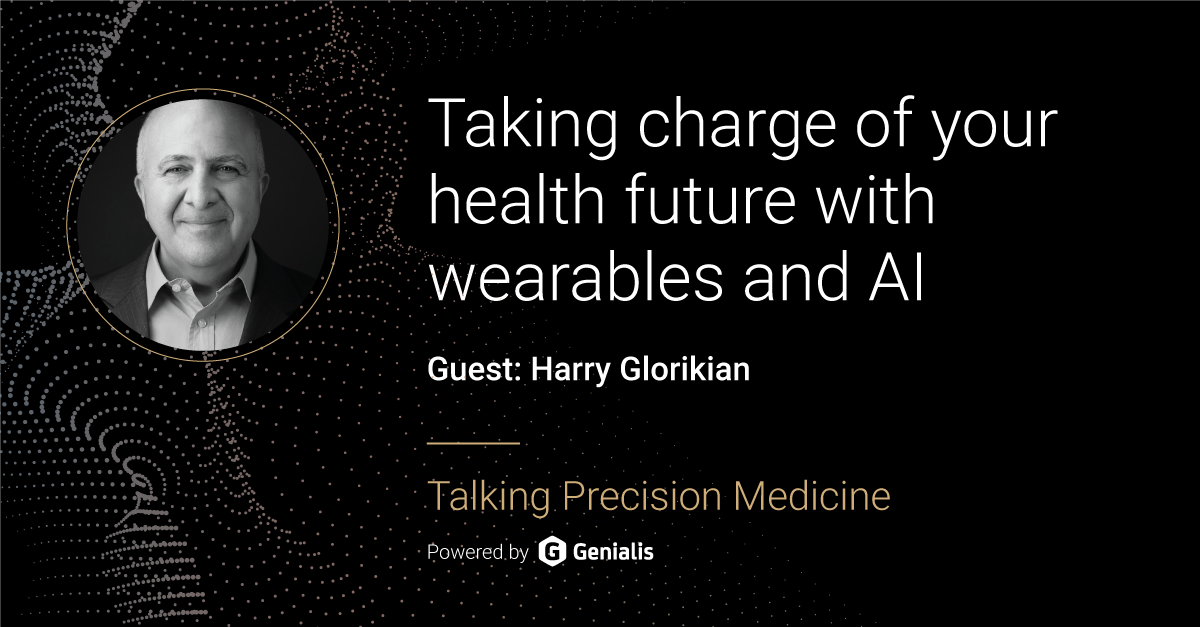Welcome to Talking Precision Medicine — the podcast in which we discuss the future of healthcare and health technology, and how advances in data and data science are fueling the next industrial revolution.
In this episode 26, our host Rafael sits down with Harry Glorikian. Harry is an investor, author, podcaster and veteran of the healthtech industry. Harry walks us through his latest book, The Future You, and expounds on the ways that wearable devices, personal health data and artificial intelligence are changing healthcare as we know it.
Come on in and have a listen.
Links:
- glorikian.com
- The Future You
- Moneyball Medicine
- The Harry Glorikian Show (podcast, Youtube stream)
Sensor based technology wearables and products mentioned in the episode:
Episode highlights:
Harry, on his book The Future You:
The Future You explores how AI is disrupting healthcare and what you need to know to navigate the new medical paradigm and improve your health in monumental ways—starting today. It covers topics like how doctors are treating once-incurable diseases by rewriting our DNA, and how AI is helping them diagnose different cancers more precisely, how people like you have used smartphone and smartwatch technology to reach their health and fitness goals, and sometimes to survive a health emergency. It explains how scientists around the world used AI to develop COVID vaccines at record speed and repurpose existing drugs to fight the virus—and how AI will help us identify future outbreaks more rapidly. There’s quite literally nothing about health and wellness that won’t be utterly transformed by the power of AI. The Future You will show you what’s coming—and what is already here.
The importance of wearables in the future
It would be foolish for people in the future not to have some sort of an early warning system that they wear to identify trends. With regular monitoring you can show your doctor 6 months of longitudinal data and because the human brain is very good at detecting the patterns the doctor can immediately pick out the bad spot just by looking at the graphs. With just one data point that’s impossible. It’s the same with clinical trials – we need a longitudinal view and enough data points to then make a decision and wearable devices are moving us in that direction. These technologies give people the insights on how to manage their health and wellness better. However, the companies still need to figure out how to nudge someone to have them respond appropriately.
Big tech companies and healthcare
Big tech companies like Apple and Google are definitely accelerating the pace by developing high quality sensors and pushing them out to the general population at a reasonable price. But Apple doesn’t make money from selling Apple Watches, they want us to wear them and they want us to subscribe to their ecosystem and they are very good at making sense of the vast amount of data their devices are aggregating. That is at the core of their business model, which is different to the majority of startups that didn’t have a fraction of that at the beginning. Despite that, startups are starting to tackle some harder problems like encryption, moving the data in a secure way, developing CRISPR technologies, data and image analysis etc. Smaller companies can work a lot faster. Their infrastructure and small teams are allowing the new models to take hold and in that way they can start to threaten the big tech status quo.
Democratization of healthcare through AI enabled tech advances
The prices of sensor based wearables are dropping rapidly but the evolving technologies will be able to do vastly more with gathering information from the patient. With data and AI there will be a concentration of power among different tech companies. There are a lot of drug discovery companies but we only have one Google which means we probably don’t need as many companies to do the things we really want to do as we go forward. And these cycles of disruption and consolidation are going to happen at a faster and faster rate.
Data curation and ownership
Aggregation of central repositories that groups can use in a reasonable fashion is important in the context of the need to advance medicine but the large-scale decisions regarding that need to be made on a government level. The smaller companies can move it forward faster so that it can be done in a more secure way but the government should start to push for more centralized data repositories that we can access. China for example has a leg up on us on that and it’s going to put our companies at a disadvantage over time. In the US, between the Congress and the Senate, the understanding of technology and its impact is extremely low and people don’t trust the authorities with their biological data even though they are publicly sharing a lot of their personal information every day by using smart devices and social media.
On adopting technologies
If you want to compete and be profitable against your competitors there’s a natural competitive environment, but in healthcare it doesn’t really exist on the provider side. However, if you’re paying for outcomes it drives people in that direction. With insurance companies adopting the new technologies the business model is turning to the premise of keeping people healthy which is actually much more profitable than treating them when they are sick. These technologies can have a profound impact on the system but there are two things to consider: are individuals in the system willing to change and will the economics of the system allow the change to happen. Because if it’s profitable to do the other thing it’s really hard to get people to change.
This has been Talking Precision Medicine. Please share our podcast with your colleagues, leave a comment or review, and stay tuned for the next episode. Until then you can explore our TPM podcast archive and listen to interesting guests from our past conversations.


